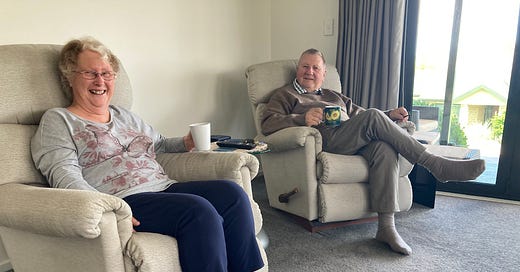A good life, but what about the future?
This post about the life and times of Marjory and George, and their musings on the state of the nation, was first published in the Golden Years column of Wairarapa's Midweek, on 18 December 2024.
George says “I’m worried about the present economic downturn. We lived through the mother of all budgets in 1991 with its long-term devastating impacts, and we’re in a similar situation today.”
Marjory agrees, reflecting on the Nordic countries they’ve visited where “all the main services are free and the average standard of living is high.” All of that is made possible by high taxes.
The couple are aged in their late 70s. George was born and bred in Wairarapa while Marjory was originally brought up in Hawke’s Bay before her family moved to Wairarapa. Her father worked on the family farm in the Hawke’s Bay, which was about as isolated as any farm could be.
“When the family farm was dissolved,” Marjory explains, “my parents bought a farm at Mikimiki, but dad had a heart attack and died six months later. It was a tough time for my mother, Marcie, with four children and the youngest aged only four. I was aged ten at the time.”
The farm at Mikimiki didn’t have a bus to get the children to a college, so Marcie bought a farm in Greytown and farmed it herself, bringing in assistance when she needed it. “Mum also got a job at a firm of accountants,” Marjory says. “She was feisty and a fighter. She lived to the age of 102, and only died a few months ago.”
After college, Marjory went flatting in Masterton and met George, who was doing a joinery apprenticeship straight out of school. “We would pile into cars and race each other going to the stock cars.”
Marrying in 1969, George and Marjory have been married for 55 years. What’s the secret of their success? “Having your own interests,” Marjory says. “Compromise, give and take,” says George. Their daughter Karen loves watching them hold hands when they don’t think anyone is watching.
As a joiner, George worked for a house building company in Wairarapa. When the owner was ready to sell, George was ready to buy. He and Marjory had a young family of four children, so it was a gamble, but George says he saw it as a challenge. He bought and rebranded the Wairarapa business as Styleline Homes.
When asked about his work life, George says, modestly, “I was in business 30 years and then I retired.” A few more details emerge when pressed. George spent his working life clocking up 90 hour weeks to make the business a success, eventually selling the firm to his son, Gareth Norris, in the early 2000s. Gareth now runs the business under the Jennian franchise.
And Marjory says they have never been “splashy” with money, so they managed to retire well. The couple moved to Lansdowne Retirement Park about the time they turned 70, and now live in a lovely villa with a grand view of the breadth of the ranges.
Although he’s no longer in the housing business, George remains interested in the fluctuations of the housing market and the country’s accompanying economic conditions.
“The housing industry is sick,” George says. “Interest rates coming down will help over time, but we need more than that. In the ‘90s, the state withdrew its assistance to lower income families trying to get into the housing market, and we’ve never recovered as a country. Without good housing for the poorest, we’ll never have a healthy, educated, happy society. Government support for entry into the housing market impacts the economy, our standard of living, the labour market, everything.”
George reflects on the fact that those who benefit most from tax cuts are the wealthy. “If you cut taxes, where is the money going to come from to cover, for example, the holes in the health system?” he asks. “Our health system is shot.”
George and Marjory both believe that, because there is not enough tax revenue for things like roads, then tolls - essentially an extra tax, but targeting only the users - are the only way to upgrade our roading.
“It’s worrying,” George says, “that people with the least are being left to sink or swim. And when they sink, the crime rate goes up. It’s a vicious cycle.”
The couple now focus on travel (around New Zealand in their camper van and around the world on cruises) and on family.
“It’s all about family,” George says, “through the ups and the downs.” They’re looking forward to Christmas with their four children and nine grandchildren.
“Our children do one year with us, and the next Christmas with their spouses’ parents and families,” Marjory says. “We make up a menu together and all pitch in. One year, we all camped in Taupo for Christmas and had a ball. A couple of times, we went to Fiji together.”
With one grandchild facetime-ing the grandies from Europe and the others ready to give hugs, with many of the grandchildren towering over their grandparents, life is good.
“But I worry about the young ones,” Marjory says. “I worry about the future. There are no entry level jobs available, not even holiday jobs. How are they expected to get experience, when all businesses demand experience?”




